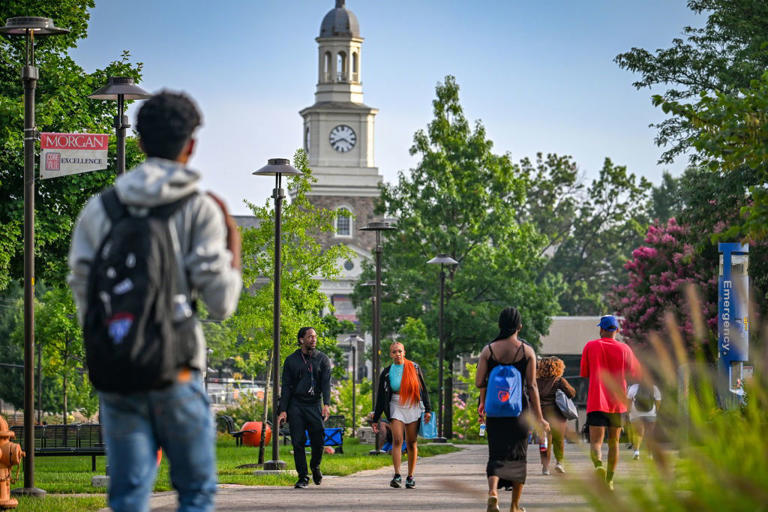The move, detailed in an April 23 White House order, threatens to undermine the progress and potential of institutions that have been vital to the advancement of African Americans for generations.
The stated purpose of the now-revoked Executive Order 14041 was to “elevate the value and impact of our Nation’s HBCUs as beacons of educational excellence and economic opportunity.”
The executive order, signed initially by former President Joe Biden, aimed to support HBCUs in providing “the highest-quality education,” obtaining “equal opportunities for participation in Federal programs,” and empowering college-educated Americans. The rescinding of the order signals a stark departure from these goals.
The full text of Executive Order 14041 can be found on the White House Archives website.
HBCUs were established in the 19th and early 20th centuries, a time when Black Americans were largely excluded from mainstream institutions of higher learning. These universities and colleges provided access to education, fostered intellectual development, and cultivated leadership within our community. These institutions of higher learning have played an integral role in producing a significant portion of the nation’s Black doctors, lawyers, engineers, and public servants.
While Executive Order 14041 emphasized support for HBCUs, its revocation raised critical concerns about the administration’s commitment to these schools and the students they serve.
Trump’s new executive order establishes the “White House Initiative on Historically Black Colleges and Universities.” Its mission includes increasing private-sector roles to strengthen HBCUs and enhance their capabilities to serve young adults. It also calls for collaboration between agencies to enhance HBCUs’ competitiveness for federal research and development funding, as well as convening an annual White House Summit on HBCUs.
However, the revocation of Executive Order 14041 casts a shadow over these stated intentions.
The impact of this decision will be felt most acutely by Black students. For many, HBCUs offer a unique and supportive environment that fosters a sense of belonging and cultural identity. These institutions have a proven track record of success in educating and graduating Black students, often at rates higher than predominantly white institutions. A 2020 study by the United Negro College Fund (UNCF) found that HBCUs graduate Black students at a rate of 47%, compared to 39% at non-HBCUs.
Furthermore, HBCUs play a critical role in awarding degrees in STEM fields to African American students. According to the National Science Foundation (NSF), historically Black colleges and universities (HBCUs) award 24% of all bachelor’s degrees earned by Black students in STEM fields. The data is particularly significant given the underrepresentation of Black professionals in these crucial sectors.
The claim that this order will “continue the work begun” to elevate HBCUs rings hollow in the face of the decision to revoke a prior executive order centered on the same goals. The claim that HBCUs provide a pathway to a career and a better life, while true, is undermined by policies that threaten their institutional stability.
While the order states that the Trump administration’s policy is to support HBCUs in “advancing America’s full potential” and “fostering more and better opportunities in higher education,” the actual consequences of this order may be quite the opposite.
It is also important to note that while HBCUs primarily serve Black students, they are not exclusively Black institutions. According to BestColleges.com, non-Black students accounted for approximately 30% of all students enrolled at HBCUs in 2022.
HBCUs have been valuable resources for a diverse student body, contributing to the broader educational landscape of the United States. The rescinding of this initiative, therefore, not only affects Black students but also has ramifications for other minority groups who seek and find success at these institutions.
The potential ramifications of Trump’s decision extend beyond the students themselves. HBCUs frequently serve as anchor institutions in their communities, providing employment opportunities, cultural resources, and economic stimuli. Weakening these institutions can have a ripple effect, negatively impacting the economic and social well-being of the surrounding areas.
Furthermore, this decision conveys a damaging message about the value placed on Black education and Black institutions by the highest levels of government. It suggests a lack of understanding or concern for the historical injustices that led to the creation of HBCUs, and the continued challenges faced by Black students in accessing and succeeding in higher education.
The language of the order, filled with promises of support and enhancement, stands in stark contrast to the concrete action of revoking a dedicated initiative. The emphasis on “private-sector” involvement raises concerns about the potential for the further corporatization of higher education, which could lead to increased tuition costs and decreased accessibility for low-income students, a demographic heavily represented at HBCUs.
The establishment of the “President’s Board of Advisors on HBCUs” within the Department of Education, as outlined in the order, is a potential step forward. However, its effectiveness will depend on the commitment of resources, the quality of its leadership, and the administration’s genuine willingness to heed its advice.
The assertion that this order will enhance the nation’s “global competitiveness” is dubious at best. A nation genuinely committed to global competitiveness would invest in its full spectrum of educational resources, including those that have historically served marginalized communities and continue to produce exceptional graduates.
The revocation represents more than a mere policy adjustment; it is a retreat from the fundamental principles of equity and inclusion that should underpin American education. The president’s decision will disproportionately harm Black students, undermine the vitality of HBCUs, and diminish the richness and diversity of American higher education.
The long-term consequences of this decision remain to be seen. It is therefore imperative that the public, policymakers, and advocates for higher education remain vigilant and vocal in their support of Historically Black Colleges and Universities (HBCUs). These institutions are not relics of the past; they are vital engines of opportunity and progress, and their continued success is indispensable to the future of American society. The struggle for educational equity is far from over, and this latest setback must serve as a call to action.

